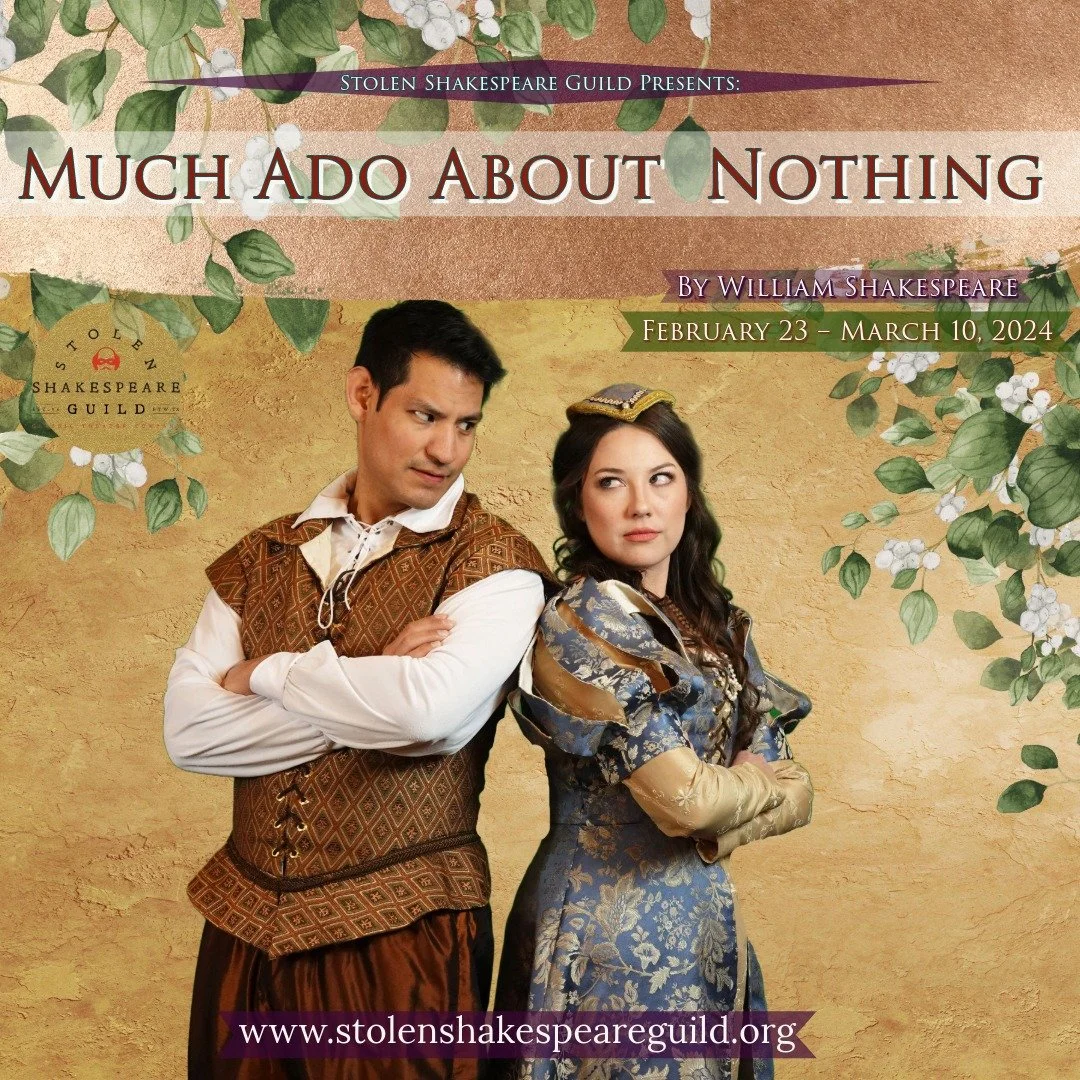‘Much Ado About Nothing’ and ‘Romeo and Juliet’ @ Stolen Shakespeare Guild (Festival 2024)
Photos by Jennifer Stewart
—Jan Farrington
Everyone has their favorite Shakespeare plays—but among his comedies (setting aside A Midsummer Night’s Dream, which is something else altogether), Much Ado About Nothing holds a particular place in my heart and head.
It’s because of Beatrice, and Benedick. Theirs is one of the first truly grown-up, mature romances I saw on a stage…and after 400 years or so, it’s still one of the best. Without collapsing the centuries between us and them, Shakespeare’s B&B could be 2lst-century friends of ours, who keep us wondering when, when they will notice they’re in love.
“She were an excellent wife for Benedick,” says the noble Don Pedro, and his pub-crawl buddies start to laugh. But he’s so right.
Stolen Shakespeare Guild captures the mostly comic/romantic mood of Much Ado very well, playing up the male-female banter, the “overheard” gossip, the zany chase scenes, and the bits with the clueless “local yokels” Shakespeare loves to throw in. We follow the progress of two love affairs, one quickly blooming, the other too mule-stubborn to reveal itself.
And SSG co-directors Lauren and Jason Morgan also have the right touch with the darker passages of the story—public shame and betrayal and sudden tragedy—that jump right into the middle of the comedy in a way that jolts…but also, feels like life.
Cory Carter and Blake Hametner are great fun to watch as the battling Beatrice and Benedick. The very minute smart and good-hearted Don Pedro (Brandon Wetch) leads his men back to Messina from “the wars” (with Benedick and young nobleman Claudio, played by Trey Smith), Beatrice and Benedick press the start button on their own “merry war” of words.
The jabs are quick-witted and hilarious, but with a surprisingly bitter undertone—and clearly there’s some history behind them. Beatrice tells Don Pedro that Benedick once won her heart “with false dice”—and she won’t let that happen again.
Claudio falls instantly in love with pretty Hero (Niamh O’Neal), only child and heir of Leonato (Dennis Raveneau), Messina’s ruler. The wedding will be in just a few days; meanwhile, there’s dancing, flirting—and intrigue from Don Pedro’s nasty half-brother, the envious Don John (Michael McCrary). He and slimy wingman Borachio (Jaxon Hess) spread an ugly rumor about Hero, mayhem ensues, and happily-ever-after pops like a party balloon.
Or does it? If this actually is a Shakespeare comedy, things will need to turn around fast.
Supporting characters are vital to carrying this odd, interesting mis of good/bad happenings. The simple, sudden joy of Hero and Claudio are nicely played by O’Neal and Smith. Claudio’s sudden willingness to believe the worst of her is hard to take—as is her father’s quick “buy” into the false rumor about his only child. (Raveneau brings long Shakespeare experience to his portrayal of Leonato; even as he rants impressively, he seems fragile and broken by this family tragedy.)
One wonders what Shakespeare means by making Hero’s fiancé and father so disastrously gullible. (Or if Hero, later on, grows up enough to wonder about that too.)
Samuel Jack and Marisa Duran are goofily comic as constables Dogberry and Verges, whose motley crew (unlikely as it seems) “get their man” in the end. Wetch’s Don Pedro is an appealing leader with a sense of wit and fun—the opposite of Don John, a dour, angry “outsider” figure looking for ways to do harm. He brings along his (smarter?) sidekick Borachio (Jaxon Hess), whose evil little laugh makes us cringe. And of course, there’s a busy Friar (the very British Conrad Spencer) crafting a cunning plan to make things come right again.
And they do. But before that happens, we get to hear Beatrice lament the limits of women’s lives (“Oh God, that I were a man! I would eat his heart in the marketplace”), and Benedick deciding that words of love aren’t enough; for Beatrice, he will challenge his friend. Theirs is one of Shakespeare’s most honest, truth-telling, thrilling conversations between a man and a woman in love.
As always, Lauren Morgan’s costume designs are period and beautiful, and D. Aidan Wright’s set (which serves for Romeo and Juliet as well) has all the arches, columns, balconies and space needed for hiding, chasing, dancing (choreo by Ashley Tysor), et cetera.
——————————————-
SSG’s Romeo and Juliet offers its own compelling couple, two teenagers who, unlike the more experienced Beatrice and Benedick, don’t have any guards up, any defenses for the emotions that explode when they see, hear, and touch The One they’ve been looking for. And though the language is poetical, Shakespeare lets us see how uncalculated they are, how raw. They blurt out exactly what’s in their heads: “Dost thou love me?”…“Oh, wilt thou leave me so unsatisfied?”
Marisa Duran as Juliet and Jaxon Hess as Romeo (Borachio’s evil laugh left behind) put an appealing emphasis on how extremely young these lovers are. She jumps with teeny-bopper glee anticipating all that’s to come, and he’s as full of swagger and fun as any boy with his besties. Both retain the endearing (yet slightly comical) capacity for love at first sight.
And both clearly understand Shakespeare’s text, which makes them able to convey both meaning and emotion quite effectively. It’s true for the cast as a whole, and a credit to their co-directors. We don’t get lost in the poetry, because they show us, in words and body language, what it all means.
I saw R&J after Much Ado; half the fun of a festival like this one is catching actors from the first play transform for the second one. Lord Capulet (Dennis Raveneau) was a fond father to Juliet, but like his Leonato in Much Ado, too quick to rage. Blake Hametner (Benedick) turned into R&J’s stern Prince, using his sharp-edged roar to lay down the law to his feuding citizens. And the Friar (Conrad Spencer) was busy and British again—but this time, his well-intentioned plans blew up in his face, and everyone else’s. He does a nice Prologue, though.
Jessica Anoruigwe and Lauren Morgan caught our interest as Lady Montague and Lady Capulet—both stately and strong, but wary of their husbands tempers and looking to protect their children. In fact, the parents have more stage time than is usual in modern productions, and expand our awareness of how their ongoing feud makes them less than reliable supports for their children.
Juliet and Romeo don’t turn to their families for advice and help—because they have, as Romeo says, “seen it all” in their young lives: the endless street fights, the injuries, the petty insults, the competitive race for money and status inside Verona’s walls. Even Juliet’s caring Nurse (Abby Rosenthal with a funny, fine take on the role), first encourages the marriage plan with Romeo, then pressures Juliet to marry her parents’ choice.
Trey Smith (Claudio in Much Ado) gives Benvolio a sturdy, faithful slant; Michael McCrary’s Mercutio (he was baddie Don John in Much Ado) gets the nervous energy of the character right; and Benji Wright Shelton is a forceful Tybalt. Fight choreography is by actor/weapons expert Brandon Wetch, whose good work shows in some fierce swordplay and dangerous-looking moves. (Row A escaped unharmed.)
WHEN: February 16-March 10, 2024
WHERE: Fort Worth Community Arts Center, 1300 Gendy St., Fort Worth
WEB: stolenshakespeareguild.org

